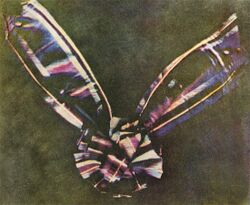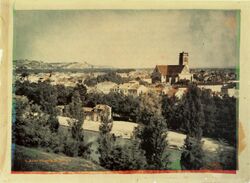Physics:Trichromy
From HandWiki
Short description: Application of color theory
Trichromy is the colour theory by which any colour can be reproduced solely combining the three primary colours. It relies on human trichromacy.
It is also referred to the three colour process in photography. French histories of photography have claimed that Charles Cros and Ducos du Hauron simultaneously invented its application to photography around 1868,[1] though English histories of photography have claimed that it was first suggested by J. C. Maxwell[2] and defectively demonstrated with the help of by Thomas Sutton in 1861 (according to Maxwell himself, Sutton's widespread photochemistry wasn't sensitive enough to red and green light).
Notes
- ↑ Patent n° 83061: Couleurs en photographie, solution du problème. [|permanent dead link|dead link}}]
- ↑ Science progress in the twentieth century: a quarterly journal of scientific work & thought, Volume 2. John Murray. 1908. p. 359. https://books.google.com/books?id=6sU-AAAAYAAJ&pg=PA359. (Note: in apparent deference to the primaries named by Thomas Young, Maxwell calls the short-wavelength primary "violet" in the relevant paragraphs of his 1855 paper, but he actually used blue in his own experiments, which the paper also describes, and in his 1861 demonstration)
 |



